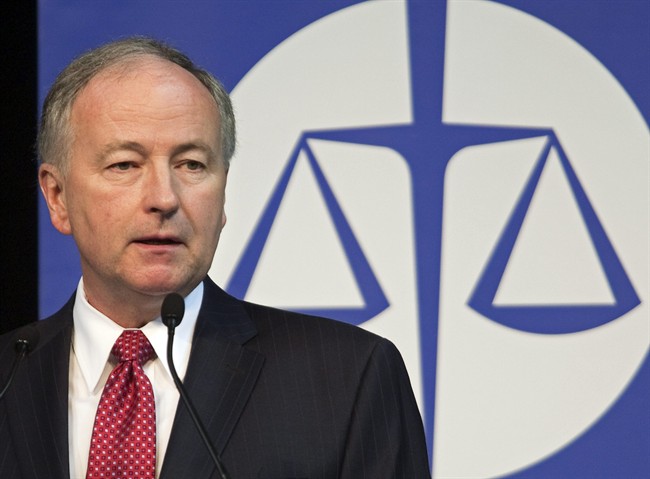HALIFAX – Canada’s judges will get no leeway on mandatory minimum sentences as Ottawa proceeds with its anti-crime agenda during the fall session of Parliament, Justice Minister Rob Nicholson said Monday.

A resolution passed by the Canadian Bar Association in Halifax during its annual conference says judges should have more discretion in cases where there could be an injustice by use of a mandatory minimum sentence.
But Nicholson told the association that the government is “comfortable” with current sentencing guidelines.
“There are a number of mandatory minimum sentences … and I would suggest to you that the ones that we have introduced are reasonable and appropriate,” Nicholson said, adding that sentencing guidelines allow judges to use discretion when delivering sentences.
Nicholson said the public gave the government a mandate to proceed based on an omnibus crime bill that was introduced but not passed before the May 2 federal election. The proposed legislation contained a number of new provisions including new minimum and maximum guidelines for organized drug crime and for sexual predators.
The governing Tories are expected to reintroduce the legislation in the fall.
“I think a reasonable analysis of what we have done in the area of mandatory sentencing will stand up to public scrutiny,” Nicholson said.
But Dan MacRury, a Nova Scotia Crown lawyer, says without more options judges are forced to incarcerate people such as the mentally ill when they may be better treated in community-based health settings.
“Too many people who suffer mental illness in this country are being treated by the criminal justice system as opposed to the mental health system,” MacRury said.
- Life in the forest: How Stanley Park’s longest resident survived a changing landscape
- ‘They knew’: Victims of sexual abuse by Ontario youth leader sue Anglican Church
- Carbon rebate labelling in bank deposits fuelling confusion, minister says
- Senator references ‘Trumpian denialism’ in foreign interference debate around China
“It’s a concern that we have that certainly has to be addressed.”
The association is seeking a legal exemption from mandatory minimum sentences for what it calls exceptional cases, such as those suffering from permanent brain injury or the mentally ill. It said other countries with mandatory minimum sentences have adopted such a measure, including the United States, United Kingdom, South Africa and Australia.
MacRury said the association would continue to push the government on the issue.
Josh Weinstein, a criminal defence lawyer from Winnipeg, said judges and Crown lawyers are concerned that the current minimum sentences are too high for many cases.
He said the legal system is set up to force more trials than resources can handle.
“There’s a heavy draw on resources because what otherwise could have been resolved where the circumstances permitted … are now matters that have to go to trial,” said Weinstein.



Comments